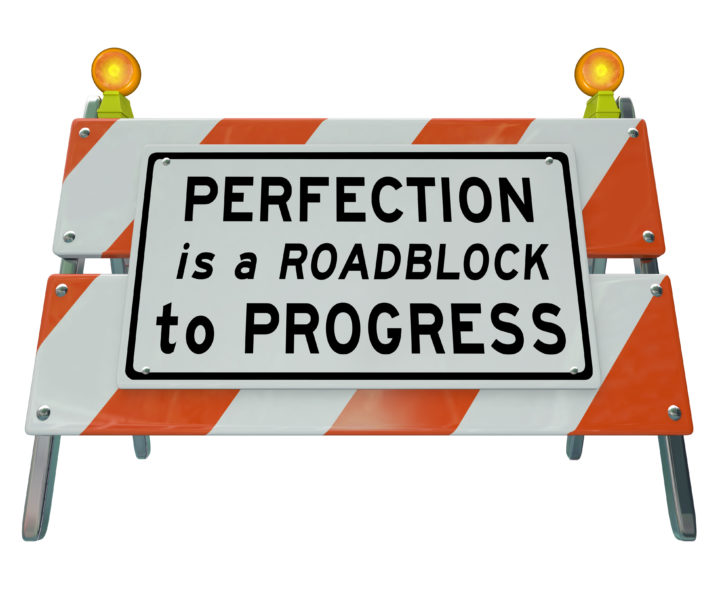For reasons that will become clear in a minute, I’m posting this article as a first draft, without any modification except to fix any of the typos that emanate inevitably from my clumsy fingers.
Here’s why: I’ve been working on a new podcast series about leadership with a friend of mine. We’ve recorded a few episodes; we like the content and we think others will too. After a lot of hard work, all that remained a few weeks ago was for my podcast partner to set up the account so that we could release it to the world, a task that only takes a few hours at most. A week went by, then another, and I didn’t think much of it. But after a month of radio silence I reached out to him to see what was going on.
He called to let me know he was getting cold feet. He said he’s been listening to other podcasts and they have such great production values, with perfect editing, sound quality, and appropriate music at the right times. He was concerned that ours would suffer by comparison.
So I told him about another friend of mine, who is head chef at one of the better restaurants in town. I have chef and his family over for dinner almost every Christmas for over 20 years. People ask me if I’m intimidated by hosting a chef for dinner. I tell them that it doesn’t bother me at all, for two good reasons. First, he’s the professional, not I, so why should I be worried about what he thinks of my cooking? Second, I cook a mean tenderloin on my Big Green Egg, and I know he loves it—more importantly, his family loves it too. It’s good cooking, it’s authentic, and everyone has a good time.
My point is that, if you have great ideas and solid content, people will get value from it even if it’s not perfect. (And there’s a lot of perfectly produced crap out there as well—beautiful-sounding but not worth listening to.) And if you wait—and wait, and wait—until it’s perfect, you’re depriving potential listeners of that value.
We both have the goal of saving the world from bad leadership, one episode at a time. And, given the apparent state of leadership in the world today, there’s not a moment to waste!
Everybody loves gifts, especially unexpected ones, so if you want to raise your game as a persuasive communicator you should strive to bring a gift to every conversation or encounter that you have with someone, even if it’s a random bump into a stranger.
When you give someone a gift, they usually want to give you something in return. Robert Cialdini, the dean of influence, says that reciprocity is one of the most powerful human drives; we seem to be compelled to balance the karmic scales when someone gives us a gift. Especially today, where we are electronically accosted at every turn by someone is constantly trying to get, we treasure those rare individuals give.
What sort of gift am I talking about? Not something tangible like a bouquet or a bottle of wine, obviously; that would be tacky and possibly unethical in most business relationships. No, I’m referring to gifts that are less concrete but infinitely more important. And the best thing is, they won’t cost you a thing, except possibly a moment’s time to remember that you have them with you.
I’m referring to social gifts, which is a term I read in a the book: First Impressions: What You Don’t Know About How Others See You, by Ann Demarais and Valerie White. The four social gifts are: appreciation, elevation, connection, and enlightenment.
If providing value is the first rule of lean communication, social gifts are the icing on top of value. In LC terms, value is delivered by improving business and/or personal outcomes while preserving the relationship. Social gifts take it one step further by altering the definition of value by just one word that can make a big difference: instead of merely preserving the relationship, they enhance the relationship.
Appreciation is probably the most powerful of all. Even the humblest among us likes to feel important, and we bask in the feeling of being appreciated. And it’s so easy to give: you don’t have to fawn all over the person or even compliment them (although it helps). All you have to do is give them the gift of attention. Listen to them as if they are the most important person in the world at that particular moment—because that’s exactly what they are. Even easier, just use their name once or twice.
Elevation lifts someone’s mood. Have you ever met someone who was so positive that they just brightened up your day, even if only for a few minutes? Moods are contagious, and even grouches love to be around positive happy people and avoid wet blankets. This is where it can pay to be “inauthentic”. Regardless of how crappy you might feel, put on a positive, upbeat, happy present face—you’ll make others feel better and maybe even yourself as well.
Connection is about finding things in common. We all like to be part of the “in crowd”, and connection helps people feel understood and included when you point out things you have in common with them. It also makes people feel more comfortable around you when they focus on your similarities and not your differences.
Enlightenment is telling them something they don’t know that they can use. As the first requirement of lean communication it’s a simple standard to measure the effectiveness of any communication. Of the four, it’s the one that can leave them objectively better off, and feeling smarter for it too!
Any one of these four by itself is a nice gift to give, but Demarais and White stress that the importance of balance. People have different preferences, so if you meet someone for the first time you increase your chances of making a good impression if you have more than one of the social gifts. And if you know them for a while, they may get bored with the same thing every time.
And, just as people have different preferences, we all have our own strengths and weaknesses. Take a minute to reflect on which, if any of these gifts you tend to leave with others. Which are your strengths, and which would you like to improve? In my own case, I would say that my strength is enlightenment, and I need to do a better job of showing others I appreciate their good qualities.
So, that’s my plan to become a better gift-giver. What’s yours?
Podcast: Play in new window | Download
In my work, I generally prefer to provide positive advice about what to do to be an effective communicator/salesperson and all-around good person, but occasionally we need a reminder that the most important rule in effective communication is “don’t screw it up”. And unfortunately, it’s so easy to do.
One of the strongest ideas in psychology is that bad is stronger than good, which is the title of an influential paper written in 2001 by Roy Baumeister and others. As they tell us, “Bad impressions and bad stereotypes are quicker to form and more resistant to disconfirmation than good ones.” That means that when you’re meeting someone for the first time, it is much easier to offend or put them off by one simple fault or mistake than by doing a lot of things right. And over the long term, it’s more important to avoid doing bad things than it is to do good things. The implication is that the long-term success of a relationship depends more on not doing bad things than on doing good things.
Relationship mistakes can be costly for three reasons:
Strength: Our minds react more strongly to bad events because that’s the way they’ve evolved. Our ancestors, in order to live long enough to pass on their genes to future generations, had to respond differently to threats than opportunities. Quite simply, it’s easier to recover from missing a possible meal than from becoming a meal! Positive opportunities can help you in the long term, but negatives can kill you now.
Speed: That’s why threats are actually processed in a different part of our brains, and are therefore much faster to be detected than positive emotions and actions. We detect negative emotions in others faster than positive ones. Negatives are also more immediately obvious because they generally don’t fit the pattern we’re expecting. When we are in a professional/business meeting, we expect a certain level of behavior; when we get it, we don’t pay close attention, but we focus immediately on anything that appears out of place.
Confidence: We all make mistakes about others from time to time, and it shouldn’t be a big deal because we should be able to correct our initial negative impression as we get to know someone better. Unfortunately, we also tend to be more sure of our negative judgments than our positive ones. One reason, is that you can’t prove a negative. If I never catch you in a lie, that doesn’t prove you’re honest. But one lie can easily tell me you’re dishonest. And once I form that first impression, my natural confirmation bias kicks in, and I interpret everything else I see and hear through that negative lens.
That’s why, according to psychologist John Gottman, it takes about five good events to outweigh one bad event.
So, what are some of the things we may do that can be turn-offs to others?
People vary, of course, but the average person we meet has highly effective and ultra-sensitive social radar that is constantly alert for threats to their interests or feelings. The following list may not be scientific or comprehensive, but I believe that in general, people are looking for four things: intentions, respect, honesty and competence.
Obviously, it helps tremendously if you have each of those four, but even if you do, it’s possible to be misinterpreted or misunderstood either through carelessness or mistakes…
Intentions
- Not listening
- Making it about you
- Treating someone like a thing
- Talking too much
- Getting angry or otherwise letting emotions take over
- Trying to develop intimacy too quickly
- Excessive task orientation, like you don’t care about them as a person
Respect
- Not listening
- Trying to show how smart you are
- Arguing
- Distraction/not listening
- Interrupting
- Excessive directness
- Impatience
Honesty
- Being inauthentic/sincere
- Lying
- Lack of candor
- Signs of nervousness
Competence
- Lack of preparation
- Mistakes
- Vagueness/overpromising
What can you do about it?
Be self-aware of your inclinations and habits. Review the list above and honestly choose one or two that you know you can do better with. Ask a mentor or trusted peer or coach for input to help you see past your own blind spots.
Prepare. Preparation has a direct effect on the competence you demonstrate, but it also has the indirect benefit of increasing your outside-in focus.
Adjust your attitude. Intentions trump techniques; if you go into every encounter with a sincere desire to add value to the other person, you will be well on your way.
Always be mindful. Reserve a portion of your mental bandwidth to monitor your own thoughts and behaviors during the conversation.
Relax. Trust your preparation and intentions. If you try too hard, that can easily come across as insincere.
Podcast: Play in new window | Download
Although common “wisdom” says it takes a long time to establish trust, the reality—as proven by scientists, law enforcement professionals and even con artists—is that we all make nearly instantaneous judgments about whether to trust people, and only afterwards refine or revise our initial impression.
While it’s not possible to predetermine how others will react to you, in this podcasts, I share three principles, two actions and two behaviors that will make you more immediately trustworthy in the eyes of others.
Principles:
Intentions trump technique
Charles Green, co-author of The Trusted Advisor Fieldbook, calls this principles over processes, and it’s one of the five attitudes he suggests you must have to create trusting relationships.
It all begins with intent. While it is possible for someone to fake it, people generally can see through you fairly quickly. Plus, it’s a lot easier and more natural to do some of the behaviors I’m going to suggest when you actually feel them yourself. It’s the same principle underlying method acting, in which the actor is taught to think of some situation in their life when they felt the emotion they are meant to portray. When they “become” the character they are portraying they find it much easier to do it.
Of course, there are people who know how to fake their intentions very well for their own ends, such as psychopaths and con artists, but that’s not really an option for normal, good-hearted people such as you and me.
There’s a bit of a paradox here, because of course one of the reasons you want someone to trust you is because you probably want something from them in return. It may be a sale if it’s a customer, or agreement if it’s a peer or a boss. But as I’ve said before, the best way to get what you want is to give others what they want by granting it to you.
Suspend your ego
Probably the most important and at the same time the hardest principle to follow. This one comes from Robin Dreeke, former FBI counterintelligence agent and author of The Code of Trust. It’s another way of saying what I’ve harped on constantly throughout my podcasts: outside-in thinking—make it about them, not you.
What does this mean in practical terms? First, try to see things from their perspective. That’s hard to do, especially when they say something you don’t agree with. Your natural temptation is to argue, but what you must do here is ask questions or seek to understand. Talk less than you normally do. Don’t try to be interesting; be interested in them. Be curious about them. Resist the temptation to tell your story. Most people love to talk about their kids, for example, but aren’t quite so enthusiastic to hear about others’ kids. Get interested in their kids.
Start with trust
It’s unrealistic to expect someone to do something you wouldn’t do yourself, and that is just as important for trust as anything else. If you want others to trust you, you have to be prepared to trust them, and to show them. “Bare your neck” One way to quickly do this is to show your own vulnerability, either by confessing a weakness or by asking for advice. Reciprocity is a powerful tool of influence, and people who have been granted a trust may be more open to granting one in return.
Actions
Earn the right
Study them. Learn as much as you can about them: their background, their education, their interests, things they have said or written, etc. People will be flattered that you did it, and it will give you material you can use to establish common ground and to ask better questions that get them engaged in the conversation.
Establish common ground
Similarity is one of the fastest shortcuts to trust. As Maria Konnikova says, “We are more trusting of people who seem more familiar and more similar to us, and we open up to them in ways we don’t to strangers: those like us and those we know or recognize are unlikely to want to hurt us.”
Behaviors
Be transparent
Good intentions are useless unless people can see them, so this is about body language and verbal language. Nonverbal is first because people see it before the first words come out of your mouth. Be forthright and friendly in your approach and your gaze, Have a firm handshake; above all, smile genuinely, and act as if they are the highlight of your day. Face them squarely as if you have nothing to hide.
Listen as if your life depends on it
This is so obvious that it’s almost a cliché, but I want to stress the idea of patient listening. In other words, don’t just listen for an opportunity to insert your own opinion or to begin your pitch. Make them feel as if they are the most important person in the room at that time. When they say something, ask questions about it: find out more about what they mean, why they said it, how strongly they feel about it, maybe get them to tell a story about how they came to feel that way.
Sources referenced in this podcast:
The Trusted Advisor Fieldbook, by Charles Green and Andrea Howe
The Code of Trust, by Robin Dreeke
The Confidence Game: Why We Fall for It…Every Time , by Maria Konnikova
Looks Matter More than Reputation When It Comes to Trusting People with Our Money






